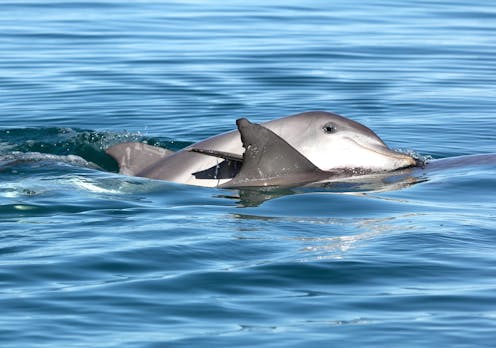Playful young male dolphins grow up to have more offspring
- Written by Kathryn Holmes, Staff Scientist, Sarasota Dolphin Research Program, Brookfield Zoo Chicago, and PhD Researcher, The University of Western Australia

As humans, we grow up playing with other children. Animals of many species likewise play with their peers. But why?
Play has its costs, especially for young animals. It uses energy that could help them grow, and it can make them more vulnerable to predators.
Of course, play is fun and highly rewarding. However, it’s not clear that these immediate benefits are worth the potentially great costs.
In a new study, my colleagues and I shed light on why play is so important – at least for the male Indo-Pacific bottlenose dolphins of Shark Bay in Western Australia. Among these famously frisky cetaceans, those who spend more time playing as juveniles end up siring more offspring as adults. The research is published in Proceedings of the National Academy of Sciences.
What’s the point of play?
One possible explanation for juvenile play is that it serves as practice of adult behaviours, such as mating and fighting. If this is correct, we would expect it ultimately makes individuals better able to survive or reproduce as adults.
It’s not unusual for juvenile animals to engage in sexual or combat-like play behaviours. However, there is little evidence to link play to long-term reproductive benefits. In some species (such as yellow-bellied marmots) this kind of play may lead to having more offspring, but in others (such as meerkats) it appears to have no effect.
Dolphins have a reputation for being playful, but we know very little about how and why dolphins play.
How young dolphins play
Our study was conducted on dolphins in Shark Bay in WA. At this site, more than 40 years of research has revealed lifelong friendships among adult males, who repeatedly cooperate in alliances to find mates and compete for them against rival alliances. Two to three males work together to keep an individual female with them for hours to weeks using joint action, in which they synchronise their physical and vocal behaviour.
In Shark Bay, juvenile play resembles these adult events, termed consortships. In small same- or mixed-sex groups, juveniles take turns playing the adult “female” and “male” roles. As in adult mating, the “males” contact the “female’s” genital slit with their beaks or genitals. Sometimes, the “males” take turns, but other times they synchronise their actions.
We examined whether male juvenile play occurred in ways that make sense if playing together is practice for key adult reproductive behaviours. We also wanted to find out whether play is associated with greater success at siring offspring years later in adulthood.
Play roles, allies and pops
To study patterns of play, we observed specific juvenile males for hours at a time to record details of their behaviour and that of their groupmates. We observed each male several times over a period of two years, and also recorded the dolphins’ vocalisations using underwater microphones.
We found juvenile males spent more time in the “male” role during play than females. Juvenile males with strong social bonds, who are likely to form an alliance as adults, were more likely to synchronise their play behaviour. If play is practice of synchronised adult behaviour, it makes sense for males to practice with their future allies.
During play, juvenile males also produced pops, a coercive vocal signal used by adult males to tell females to stay close. As in consortships, juvenile males specifically produced pops when females were present and both sexes were in their adult roles. Compared to the regular rhythm of adult male pops, juvenile male pops were erratic, suggesting they need practice to achieve the adult rhythm.
More time playing linked to siring more offspring
Juvenile male dolphins play in ways that appear to be practice of future adult mating behaviour. The final test of this was to see whether spending more time playing in the “male” role as juveniles led to siring more offspring in adulthood.
For this analysis, we leveraged past observations of juvenile male play from 1998 to 2003, along with up to 22 years of genetic paternity data for each male.
Dolphins in this population can live well into their 40s, and undergo an extended juvenile period where males do not sexually mature until between the ages of 12 and 15 years. We therefore needed decades of data on individual males to look at long-term benefits of social play.
Males who spent more time as juveniles playing at their future adult roles sired more offspring as adults.
This tells us social play is more than just fun. It’s an important behaviour for male dolphins that gives them time to practice critical reproductive skills several years before they are needed, and, it appears to make them more successful as adults.
As this practice is happening, the young males are also strengthening friendships that will mature into lifelong alliances. Does play also help them choose their friends? In future research, we plan to find out.
Authors: Kathryn Holmes, Staff Scientist, Sarasota Dolphin Research Program, Brookfield Zoo Chicago, and PhD Researcher, The University of Western Australia
Read more https://theconversation.com/playful-young-male-dolphins-grow-up-to-have-more-offspring-231491





